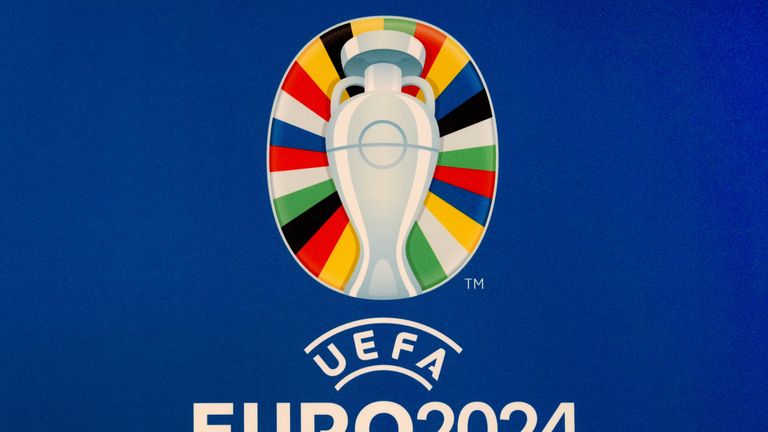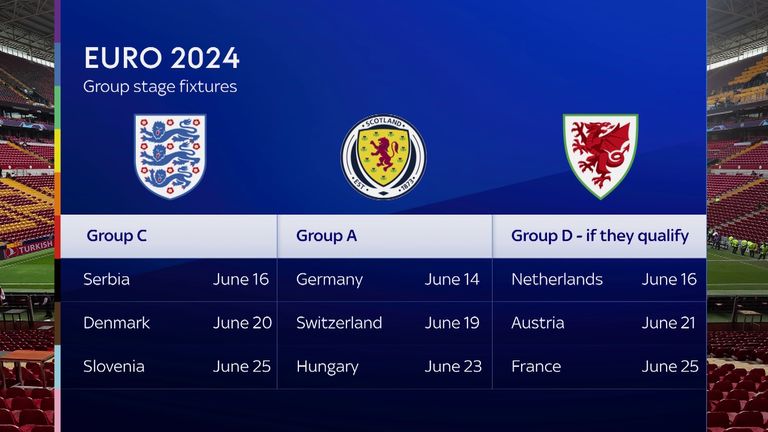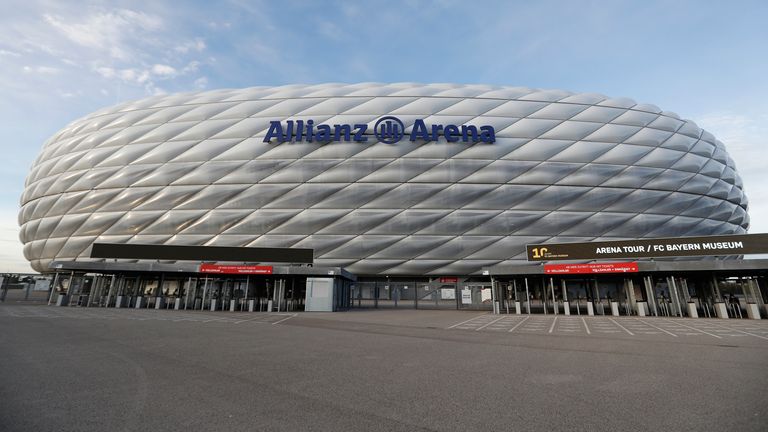UEFA are trying to reduce air travel to make Euro 2024 the most environmentally friendly tournament ever; England and Scotland face long trips to their group games; Teams and fans are being encouraged to travel by bus and train to matches but there will be a “common sense” approach applied

Sky Sports’ Rob Dorsett explains UEFA’s latest requirements regarding the travel options for teams and fans during the 2024 Euros in Germany
England could face a six-hour round trip by coach for one of their group games at Euro 2024 as UEFA tries to reduce air travel to make the tournament the most environmentally friendly ever.
For Scotland, the journeys could be even longer with the distance between their first and second group games totalling more than 550 miles.
However, whilst UEFA said last summer that it would be a “requirement” for all teams to travel by land for matches at the tournament, Sky Sports News has been told that there will now be a “common sense” approach taken, where no team will be banned from flying if the circumstances make that the most feasible option.
- Euro 2024 fixtures, schedule, groups, venues
- England’s Euro 2024 fixtures and route
- Scotland’s Euro 2024 fixtures and route
Last summer, when UEFA and the German authorities laid out their strategy for the tournament, it was made clear that this would be the most environmentally friendly Euros finals ever.
UEFA has designed the match schedules so that – in theory – there is less travelling for the teams, and for supporters.

Image: England, Scotland and should they make it through March's play-offs, Wales' Euro 2024 fixtures
A “Climate Fund” has been created, where it is promised that for each tonne of CO2 emissions produced at EURO 2024, €25 will be donated to environmental projects. They predict that will mean around €7m (£6m) will be generated.
UEFA’s sponsors for the tournament are also more environmentally responsible than ever before. Whilst Gazprom were sponsors of Euro 2020, for example, there are no gas, oil or other utility companies in commercial partnership with UEFA this time. Instead, BYD are sponsoring the tournament, which is one of the biggest global developers of electric car technologies.
The tournament organisers have promised they will reduce energy consumption, use renewables more, increase recycling and reduce water consumption.
But the most controversial element of UEFA’s plans surrounds travel during the tournament for both teams and supporters.
Andreas Schar, managing director of Euro 2024, said last year: “It is a very important part of our sustainability strategy: when the teams and fans travel, we would like them to do so by bus or train.”

Image: Allianz Arena in Munich will host the opening match of Euro 2024 between Germany and Scotland on Friday June 14
There will – deliberately – be fewer car parking spaces available near stadiums to try to deter car travel. Fans will be given discounts for rail and bus travel and there will be a free shuttle service for 36 hours before and after matches.
However, there is an obvious flaw in UEFA’s plans to “cluster” two of every nation’s group games near each other. Schar said: “This allows the teams to get to know the stadiums and gives the fans the opportunity to stay in the same area for two matches.”
That strategy ignores the fact that a nation’s training base may be large distances from the stadium so they will still have to travel back and forth.
In England’s case, their first game is against Serbia in Gelsenkirchen, their second against Denmark in Frankfurt and their final group game is against Slovenia in Cologne. All three venues are located in the West of Germany but England’s training base is more than 250 miles away from all three, in East Germany.

Image: MHPArena in Stuttgart where Scotland will play their final group match against Hungary on Sunday June 23
England’s choice of base was determined by the quality of the facilities, its remote location away from big towns and supporters, and the distances to possible matches in the knockout stages too.
In Scotland’s case, the distances are even greater – though it’s thought this has been skewed by the fact that Steve Clarke’s side have the honour of kicking off the tournament in the showpiece opener against the hosts in Munich.
Scotland’s second game is 283 miles away from Munich, in Cologne. That is more than a six-hour drive or four-and-a-half hours by train.
Two of Scotland’s three group games are in stadiums relatively near to each other – Stuttgart and Munich are 144 miles apart – but those venues are for Scotland’s first and third matches in Group A, with a potential 12-hour round trip to the North West of Germany for match two, in between.
UEFA’s mission is a laudable one: to try to reduce travel distances for teams and supporters, limit flights, reduce energy consumption, increase renewables and recycling, and improve sustainability across the whole tournament.
However, the complex logistics for each nation taking part means that there will be no hard-and-fast rules applied, to how teams will be allowed to travel.
England’s Euro 2024 Group C fixtures
Sunday June 16 – Group C: Serbia vs England (Arena AufSchalke, Gelsenkirchen – kick-off 8pm UK time)
Thursday June 20 – Group C: Denmark vs England (Waldstadion, Frankfurt – kick-off 5pm UK time)
Tuesday June 25 – Group C: England vs Slovenia (RheinEnergieStadion, Cologne – kick-off 8pm UK time)
Scotland’s Euro 2024 Group A fixtures
Friday June 14, 2024 – Group A: Germany vs Scotland (Allianz Arena, Munich)
Wednesday June 19, 2024 – Group A: Scotland vs Switzerland (RheinEnergieStadion, Cologne)
Sunday June 23, 2024: Group A: Scotland vs Hungary (MHPArena, Stuttgart)
The top two in each group plus the four best third-placed teams go through
Sourse: skysports.com






